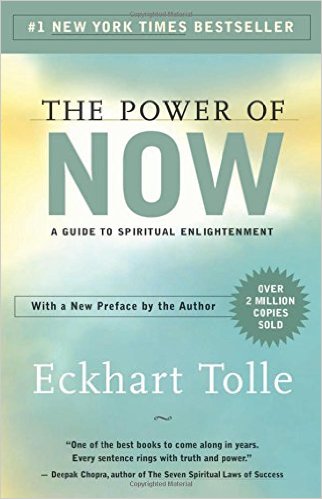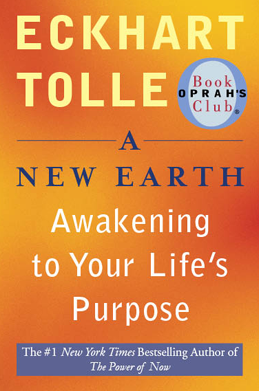|
Word Gems
exploring self-realization, sacred personhood, and full humanity
Editor's 1-Minute Essay
An Alien's TravelGuide to Planet Earth:
Life, the Uncharted World
return to "Life" main-page
only the most precious gold nuggets to be offered
As I consider possible topics to be including on the Word Gems site, I ask myself, "What is the most valuable information I might impart to others? Knowing what I've come to know, what do I deem as vital for others to understand?"
The following discussion and writings of Eckhart Tolle and Peter Russell, I have come to see, constitute essential guidance for any thinking and success-oriented person.
Allow me to present three excerpts of their work, followed by my own commentary.
|
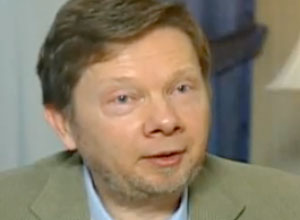
an excerpt from Eckhart Tolle's "The New Earth"
more powerfully transformative than 100 seminars and workshops
Discover inner space by creating gaps in the stream of thinking.
Without those gaps, your thinking becomes repetitive, uninspired, devoid of any creative spark, which is how it still is for most people on the planet.
You don't need to be concerned with the duration of those gaps. A few seconds is good enough. Gradually, they will lengthen by themselves, without any effort on your part. More important than their length is to bring them in
frequently so that your daily activities and your stream of thinking become interspersed with space.
Someone recently showed me the annual prospectus of a large spiritual organization. When I looked through it, I was impressed by the wide choice of interesting seminars and workshops. It reminded me of a smorgasbord, one of those Scandinavian buffets where you can take your pick from a huge variety of enticing dishes.
The person asked me whether I could recommend one or two courses. “I don't know,” I said. “They all look so interesting. But I do know this,” I added. “Be aware of your breathing as often as you are able, whenever you remember. Do that for one year, and it will be more powerfully transformative than attending all of these courses...”
Being aware of your breathing takes attention away from thinking and creates space. It is one way of generating consciousness. Although the fullness of consciousness is already there as the unmanifested, we are here to bring consciousness into this dimension... One conscious
breath is enough to make some space where before there was the uninterrupted succession of one thought after another.
Editor’s note: In an online discussion I added this:
Daily deep breathing, be it only 60 seconds, will be more powerfully transformative than attending 100 seminars or 100 church services.
Why is this so? It stops the “monkey mind,” the chattering in the head. And why is it so important to stop the monkey mind? The monkey mind is the voice of the dysfunctional ego which attempts to convince us, “I don’t have enough” because “I am not enough.”
Stopping the monkey mind, even a brief daily meditation of 60 seconds, over the months, allows us to realign our inner selves, attune ourselves, to Universal Intelligence. And that’s all anybody needs, today or a million years from now.
|
what every new person to spiritual practice must understand
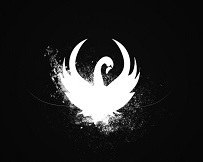
| Breakthrough: “Spiritual practice must be uninterrupted. We may be anxious because we see very little happening on a daily basis, but we must be patient… After long self-cultivation, one’s accumulated energy reaches a threshold and then bursts out, like a swan rising from the water… Once you have reached this level of stored energy, you will be a different person.” Deng Ming-Dao, 365 Tao |
|
If you tell others about “going within” and spiritual practice, most won’t believe you. Instead, they’ll opt for “I’ll become a good person by trying very hard.” However, I’ve asked myself, what convinced me early on to stay with this process, though it might take years for real change? I think it was Tolle’s explanation of the “voice in the head” and the background witnessing presence that drew me. He told his story of a late-night despair – “I can’t live with myself!” – but then recoiled with “Who is this ‘I’ and this ‘self’? Are there two of me?” This testimony impacted me greatly, and I caught a glimpse of what he had discovered. This brief introduction, I think, helped me to realize that there’s some sort of hidden life or energy in my mind and spirit that I’d been unaware of. I could feel the difference now between “the voice in the head” and the part of me that knew of its existence. These were two separate things. And I believe that it was this understanding, right at the beginning, that helped me to stay with the “long self-cultivation”, as Deng put it. It would be years before I perceived any real results. Others around me saw it before I did. But, I will say this: Once that “threshold” is attained, the “bursting” will result in a daily surfeit of insights and flashes of perception that will overwhelm. Deng is correct: at this stage, “you will become a different person.” Why does this happen? I think it’s like a tiny seed of godhood buried deep within. It wants to blossom and emerge. The key is to provide the right conditions for germination to occur. We don’t have to try to change, for once it begins in earnest, it will virtually steamroll the willing student into new thought patterns, and will change us from the inside out. Hang on to this rollercoaster, as it will take you for a ride. Others likely will not believe these words. You have to experience it for yourself.
|
|
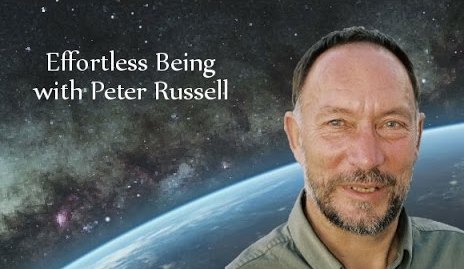
excerpts from the writings of physicist Peter Russell
the hope of every person is simply peace of mind; behind all our 'busy-ness' lies the desire to be happy, to feel content, relaxed, and at ease
One of the topics that Eckhart and I discussed [see below] in our conversation was how effortless meditation should be, that no striving or concentration is needed. Some of you might be surprised when you first hear this. I know I was. When I first began meditation, I was repeatedly told that it took great mental discipline and many years of practice.
And my experience appeared to confirm it. My mind was full of thoughts, and try as I may, I could not keep them at bay. Like many others, I naturally assumed that I was not trying hard enough; I needed greater mental discipline, not less.
But over the years, I’ve come to appreciate that a quiet mind is not a state of mind to be achieved. It is the state we experience when there is nothing to be achieved. It is the mind in its natural condition, untarnished by fears and desires, and the thoughts they create. When everything is OK in our world, we feel OK inside; we are at ease. Or rather, that is the way it should be. Yet, even when all our physical needs are met, and there is no immediate threat or danger, we seldom feel at ease. More often than not, the very opposite. Leave us with nothing to do, and most of us start getting bored. If someone upsets us, we may hold a grievance days, weeks, or even years after the event. Or we may spend hours worrying about situations that could occur, but seldom do.
Along with such feelings come an almost endless procession of thoughts. Most of these thoughts boil down to worries about how we can be more at peace. Yet, ironically, a worried mind is, by definition, not at peace. This is the sad joke about human beings. We are so busy worrying whether or not we are going to be at peace in the future, we don’t give ourselves the chance to be at peace in the present.
Given how easily such thoughts arise, it is easy to assume they must be subdued and controlled. But that approach stems from the same belief that created them—the belief that we need to be in control of things in order to feel at peace. As a variety of meditation traditions have revealed, a more effective approach is to accept that thoughts occur and learn how to work with them...
In the final analysis, the hope of every person is simply peace of mind. Behind all our endeavours lies the desire to be happy, to feel content, relaxed, and at ease. No one wants to be in pain or to suffer unnecessarily. This is our true bottom line. We may think we are seeking some external goal, but we are seeking it in the hope that, in one way or another, we’ll feel better for it.
Why then, are we so seldom at peace? After all, we’re intelligent beings, who can look ahead and plan for the future. Moreover, we have many tools and technologies with which to create a better world. One would think that we, of all creatures, would be content and at ease. Yet the very opposite seems to be the case. Paradoxically, it is our remarkable ability to change the world that has led us to this sorry state. We have fallen into the belief that if we are not at peace, then we must do something about it. We believe we need to attain some goal, possess some thing, find some new experience; or conversely, avoid a situation or person that is causing us distress. We assume that, if we could just get our world to be the way we want, we would finally be happy.
In the short term, this approach seems to work. When we get what we want, we usually do feel better. But only for a while. Before long, we are off in search of some other source of happiness.
We live in what Indian philosophies call samsara, which means “to wander on.” We wander on, looking for happiness in a world that provides but temporary respites from our discontent, fleeting satisfactions followed by more wandering on in search of that ever-elusive goal.
Moreover, believing that peace of mind comes from what we have or do often makes us feel worse, not better. Imagining that something is missing or needs changing creates discontent. Our attention gets preoccupied with what we need, the choices to be made, the plans to carry them out—much of it concerning situations that don’t yet exist, and probably never will. Our thinking moves from one issue to another with seldom a pause.
Rather than feeling more at ease, we generally end up more tense. Throughout history, there have been those who’ve discovered a timeless truth about human consciousness: Our natural state of mind is already one of ease and contentment. By “natural” they do not mean the state of mind in which we spend most of our time—which, for the vast majority, is not one of ease and contentment. They are speaking of the mind before it becomes tarnished with desires and aversions. It is how we feel when everything is OK; when we are not worrying about anything.
Time and again they’ve told us that we don’t need to do anything, or go anywhere to be at peace. We simply need to cease striving for a moment. Let go of any attachments as to how things should or should not be. Become aware of our experience in the present as it is, without resistance or judgment. Then—and this is key—let the attention soften and relax.
When we do, we taste how it feels to be free from worry, anticipation, deciding and planning. We find the peace of mind that we have been seeking all along. A peace that is not at the mercy of events, or the vacillations of the thinking mind. A peace we can return to again and again.
|
|
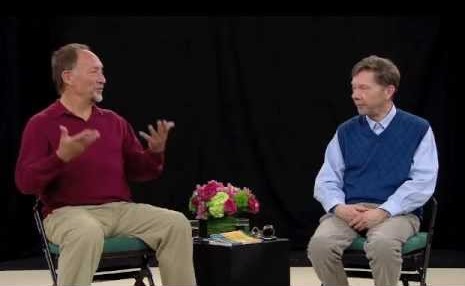
excerpts from a discussion of physicist Peter Russell and Eckhart Tolle on the subject of consciousness
even the question, 'what is consciousness' is a wrong question, as it sends us to something external, because we are the knowing, we are the consciousness
(they begin by discussing Peter's view on meditation)
Peter says that in early years he pursued a structured and formulaic meditation, but today he sees it all as something "getting simpler and simpler."
P. "To me, meditation is letting go" of the mind's fixation on the cares of this world. "It's not trying to stop thought," it's not about "a lot of concentration, a lot of effort," but "it's about not doing anything, but the mind wants to do something... And so I help people to spot, just to notice what is, and just to notice when that slightest bit of wanting and trying comes in... [which is a form of] resisting the present moment.
E. "The very idea that I am 'doing' a meditation can become an obstacle because this thought comes in between you and simply being."
P. "Right. You can't 'do' meditation, but it's an exercise of awareness, a bringing an awareness to what is, and it's the resistance that keeps us locked in, and it's bringing an awareness even to the resistance, so when you notice some slight holding back, just be aware of what that feels like, what does it feel like to be resisting what is?"
E. "You can be the space even for the resistance. And then you can take a step back from there and say, 'there's the resistance' -- whatever arises you can be the space for that."
P. "I say to people, 'don't resist the resistance,' but paradoxically you can 'relax into the resistance.' It's there, you don't try to get rid of it, there's a faint sense of tension here of resisting, ok, just notice it, what is it like, and just relax into that, and, of course, as soon as you do, it just dissolves."
E. "Yes... that's lovely... it sounds quite easy." (laughter from the audience)
P. (laughing) "It is totally easy."
E. (smiling) "It is ease itself."
P. "It is ease itself. However, these minds [of ours] have been trained to “do” things, and they’re well trained to do things well, and to do things better, and so, “maybe if I just tried a little bit harder it would be even better.”
E. "Yes, yes."
P. "We’re so trained in this mindset to “do,” to try, to make things better – and so, in some ways, meditation is an “untraining of the mind,” to step back from all that conditioning we’ve known all of our lives."
E. "Yes, wonderful."
(they begin to speak of consciousness)
P. "I think it's even wrong to use the word 'conscious-ness' because we make it a thing, we make it a noun. As soon as we add '-ness' to anything we turn a quality or an attribute into something we can talk about, it's useful for language, but...
E. "Yes, it becomes an object, a mental object, but is there a better word for this..."
P. "I think we should not use nouns for it, because as soon as we use a noun, whether it's consciousness, awareness, whatever, we make it into a thing, which implies that we're beginning to look for another object, another form of perception, and so even the question, 'what is consciousness' is a wrong question, because we are the knowing, we are the consciousness, and [with this question] we begin to look to other than what we are."
E. "The question immediately makes [consciousness] into an object [of the external world, and deflects attention from the true source, ourselves linked to God]."
P. "And so I prefer to use verbs for this."
E. "Ok, let's see what that sounds like." (laughter from the audience)
P. "Well, 'I am aware' and there is 'awaring', and 'knowing' and there is 'experiencing' -- 'conscious-ing' doesn't work."
E. "With 'awaring,' you have to create a new word to get rid of the inherent error of nouns."
P. "And so I think science is misleading itself by the very act of looking."
E. "Science can never find the answer to consciousness unless or until the scientist becomes introspective... in other words the scientist has to become a mystic."
P. "I think a scientist can become a mystic. I think we need to draw a distinction between science as it's practiced now, the belief-systems of science, a very materialistic [process] as it excludes 'awaring,' and deliberately has done so, because you can't measure it, you can't put a rule up against it..."
|
mind the gap
|
The Russell-Tolle discussion addresses matters of extremely high moment. However, if you’ve not yet personally experienced what they’re talking about, it might seem vague and unreal to you. Since I have experienced and lived it, I know what they’re talking about; as such, there’s a point or two I might offer to clarify; however, even with my small amending, it will still be unclear until that coming day of entering into this reality for yourself. Nevertheless, consider the following:
There’s a phrase I recall from my long-ago college days in Britain. In the UK subway terminals, you’ll find signs posted: “mind the gap.”
“Mind the gap” means notice the gap, be aware of the gap. There’s a rather large space between the platform and the train-cars, and one needs to be careful when boarding or exiting.
“Mind the gap” is good instruction for us, too. As we learn to sense the life within, we’ll be able to say, “Here’s the real me, the true self - and over there, not part of the real me, are all the egoic aspects of self: the fears, the worries, the incessant chatterings in the head.”
This is what Russell means when he says that we need to “step back” from all of the “mind conditioning.” This stepping back or letting go is the “untraining” of the mind,” as he puts it. Why does the mind need to be untrained? It is so because the mind naturally, due to years of conditioning, believes that more “doing” will solve every problem. Of course, sometimes “doing” is called for; “doing” works just wonderfully – except for the most important issues of life.
Why does the mind naturally opt for “doing”? It does this because, in its current state of blindness, it knows nothing of “being” and so, by default, is shunted toward “doing.” The egoic mind is ignorant of its real identity, the true self, composed of Universal Consciousness. It’s currently incapable of “minding the gap.” It perceives no space, no gap, between its essence and egoic mental constructs. Without this gap, one’s sense of self merges with the egoic thought-forms, seemingly becomes one with them, identifies with them. This systemic illusion is what needs to be expunged and “untrained” from the mind.
Tolle said “you can be the space for the resistance.” The “resistance” is the egoic mind, long-conditioned as an extension of the “false self,” ready to fight any notion of believing that its part of Universal Consciousness. This false self, for many years to come, and many times a day, will try to take you over, and take you back, into its domain of egoic thought-form. To “be the space for the resistance” means to simply allow this enemy within to put on its Halloween mask and try to scare you into subservience; allowing “space” means allowing it to be – don’t fight it. Just let this energy spend itself. It cannot hurt you. It’s just a phantom with no real power. All it can do is to make you temporarily feel bad – it’s done that for decades – by playing “sad movies” in your head. But if you awaken to the reality that it’s just a “movie in the head” with no real substance; if you simply allow it to play the part of the hobgoblin with attempts to scare you; you will rob it of its power, and then it will simply “dissolve.” However, like the Terminator, it will be back to try to take you over again, with new scary movies, new fears, but its power will grow less and less, as you are no longer deceived about who is the “real you.” This “allowing” is what Russell means by “relaxing into the resistance.”
I decided to write these clarifying paragraphs as I considered Peter’s phrase, “just notice it, simply notice the slight resistance, the small amount of wanting and needing trying to slip in.” Despite the wisdom of these words, a small amount of clarification is helpful. It’s best to witness the resistance from the vantage point of the safe-and-secure true self; because, if we do our noticing while being taken over by the false self, that is, without even realizing that there is such a thing as a true self, then we will be witnessing, or “noticing,” ourselves slipping into more and more despair. I’m sure Peter realizes this, and it’s difficult to speak to everything in a short discourse, and so, since this might be a cause of confusion for some, I decided to offer a short commentary. And I will tell you this: though I’ve been working with the “true-false self” issue for many years now, these clarifications help me as, well, because the “false self” does not give up so easily, and will attempt to overthrow you, every day of your life.
Why does it have to be so hard? Why does it have to be this way? It’s part of becoming a true person. It’s part of what Spirit-Guide Abu called the soul’s sacred individualization process. It’s like muscle-building, weight-lifting. Every time we assert the ontological powers of the “true self,” we strengthen our authentic sense of self – the eternal true self, that part of us, the “real” us, that will inhabit and traverse eternity. We’re building for the future; a very long one.
a castle with a moat
The true self is like an impregnable castle, surrounded by a moat. Why is the true self like an unassailable stronghold?

|
Mind The Gap: the moat around this castle is like the "gap" or “space” around the “true self.” But this gap, as per our castle analogy, is not for protection but is a field of awareness, a perception of “what is you” as opposed to “what is not you."
|
It is so because our essential essence is not made of fading matter but indestructible Universal Consciousness. As we’ve discussed elsewhere, “only Consciousness is real,” and so what we are on the deep-inside constitutes the only reality. Other perceptions flashed to us by the "false self" are mere pretenders to the throne, and cannot harm us. In this world, our true identities, wrapped in seeming mortality, do not fully manifest, but in a world soon coming, “one missed heartbeat away,” we will be revealed, especially to ourselves, in our immutable, incorruptible immortality.
Editor’s note: In the taped lectures of Spirit-Guide Abu, the ancient sage states, to the effect: “No one can hurt you. People in this world may do unkind things to you, but none of that incivility, though unpleasant, can reach your essential essence, your soul. There will be no lasting damage. However, it is possible for you to damage yourself if you were to become bitter or vengeful toward these immature spirits.” This is exactly what Jesus said, as well: “Do not be afraid of them. They can only kill your body.” And that’s not very much. Further, Spirit-Guide Abu has a pet phrase that he likes to use: "You have the horses"; meaning, "You're in charge of your own life! You guide and direct your own destiny"; which is to say, "Make it a good one. Be a bright star. Be all can be. No one can or will stop you. This is not possible as Mother-Father God are fully behind you in all of your sacred endeavors."
'the kingdom of heaven is in your midst'; or, as some translations have it, 'the kingdom of heaven is within you'
I’m reminded of an assertion of Jesus: “the kingdom of heaven is in your midst.” Some churches, threatened by the “made-in-the-image for all" principle, errantly interpret this New Testament verse by saying, “Jesus meant, ‘I am plainly standing here before you, in your midst, as the great ambassador of God’s kingdom, and a member of the Trinity.” (See "The Wedding Song" for a discussion of “eisegesis,” a diseased literary analysis of injecting one’s own prejudices and private viewpoints into another’s message.)
However, there are so many things wrong with this latter interpretation – see my “Jesus article” – and in contradiction to other things Jesus said, one hardly knows what to address first. But the best way of determining what Jesus meant is by reviewing the immediate context of his words. See this in Luke 17:21. Essentially, he said,
'Look! It's up there!'
“The kingdom isn’t something you can point to. It doesn't have three-dimensional elements. You can’t gaze in the sky and say, ‘Look, there it is!’ or you can’t see it on the horizon and say, ‘Look, over there, it’s coming our way!” No, none of that. The kingdom of God is not something material or made of matter. The kingdom is in your midst; the kingdom, if you have eyes to see, is within you, in your very hearts and souls.”
We know that this is what Jesus meant because in other places he said the same thing in different words. For example, in John 4, in his conversation with the Samaritan woman at the well, he said, to the effect,
“You have life eternal, inside you, right now, like a natural reservoir of living water, an artesian spring of refreshment, that effortlessly bubbles up to the surface of life, with no work on your part required at all.”
what does this mean for us
What is the practical significance of “the kingdom is within you”? It is most wonderful knowledge and presages a most wonderful future.
Many people look forward to “going to heaven”; and it is well that they should. However, they desire this not so differently than a longed-for trip to the white sand Cayman beaches; or even a trip to Disneyworld.
A trip to heaven, to Summerland, is marvelous, indeed; as would be a trip the Caymans or to Disneyworld. The new arrival, to any of these destinations, would experience a sense of thrill, of relaxation, and pleasure. However, without something more, eventually, the good vibes of it all would begin to fade and even disappear.
We know this because there are millions or billions on the other side, even in the “good neighborhoods,” who have slipped into a form of mental dysfunction. Actually, it’s not so much that they’ve acquired this mental imbalance over there, but that they took it with them from this world. After the novelty of the “good life,” all the material pleasures of Summerland began to wear thin, the old “false self” reasserted itself and started to contaminate whatever they thought about. See my extensive article, “The 500 Testimonies from the Other Side.”
we cannot escape ourselves; but that could be very good news
The truth is, wherever we live in the next world, our joy and pleasure will not issue as a function of our zip-code. We might choose to remain on a “lower” level of Summerland – quite beautiful, far more than anything on the Earth – if we believe that our best service might be rendered there; or we might opt for some so-called “higher” world; but, if we do, spatial positioning will have nothing to say about our sense of well-being. It doesn’t matter where we live.
Like that castle with a moat, an invincible “kingdom unto itself,” we – linked to Universal Consciousness - at each and every moment, within the sanctity, the “holy of holies,” of our own minds, possess all the heaven we shall ever know.
we cannot escape God’s mandate that we ‘come alive’
We are required to find our true selves; it’s built into our deepest nature. We will not find our lasting joy, in this world or the next, without this existential discovery.
But think of the positive aspect, what this really signifies for us. If the “kingdom is within us,” then this means that we take heaven with us wherever we go. Heaven, joy, ultimate reality, in its essence, is with us right now. To reference Jesus, we can’t say, “Look, there it is on that higher level of Summerland, and if I can just make it to that ‘better 7th-level of heaven,’ then life will be good.” But it doesn’t work that way; even though there are billions of deluded ones over there, as in this world, who do believe that heaven, in its most meaningful sense, is a place you travel to.
Yes, of course, we do wish for better accommodations to come, a better world of flowers with brighter colors – all this and so much more will be utterly wonderful; but without an accessing of the “true self,” we won’t be able to fully enjoy, or sustain ourselves with, any external blessing. This includes your Twin Soul, which we've discussed in hundreds of pages.
In order to discern the "true self," we'll need to "mind the gap." When we are able to perceive the intervening space, we'll also be able to sense who we truly are, in contradistinction to who we are not.
Tolle's books offer good advice concerning these issues.
|
The writings and discussions of Tolle and Russell offer much wisdom; I would say, the wisdom of the ages, in that, no information could be more important to one's well-being and evolvement than what you are about to learn.
why is this information so important
It's important because we're talking about life; not our life-situation, which is constantly changing, but life itself, the immutable, eternal, animating principle subsuming all things. This 'life' is resident, to various degrees, in all elements of creation, from a lowly sub-atomic particle or a stone, to plants, animals, and spiral galaxies. We're on the continuum, too.
But now we've said too much and have carved out a territory far too expansive to address in this forum. The Wedding Song dialogues well explore this issue, and take a good portion of the book to do so, and therefore we cannot replicate that disquisition here. However, for the moment, allow me to restate major points and also add some new information.
it's about coming alive
On the "Afterlife" main-page, as prelude to item #26, an overview of Eckhart Tolle's work, I said this:
Consciousness - which, as Goswami instructs us, gives material form to the universe - also provides essence of the True Self.
The implications are utterly profound and far-reaching. No subject could be more important; because if we fail to come into our own, fall short of accessing who we really are, we'll be of little use to ourselves or others.
Everything - one's entire future, all that we hope to do, accomplish, and possess - hinges upon first coming alive.
Tolle and Russell are talking about the underlying "one life" of God, about coming alive in terms of higher consciousness. But this statement immediately plunges us into difficulty: "What do you mean, 'coming alive'? Am I not presently alive?"
Well, we can't say for sure in your particular situation, but if you have to ask the question, then, you're probably not.
relaxing into the resistance
What is all this strange talk about "relaxing into the resistance" and many other similar non-intuitive statements? And how did you feel when Eckhart made the claim that "conscious breathing" would do more for your advancement than 100 self-help workshops?
Most people will consider these kinds of assertions to be incomprehensible and utter rubbish. Yes, it's a predictable response from those who've not yet "come alive."
|
surrender to the current, silence your ego, and your power will rise

Doctor Strange (2016), The Ancient One (Tilda Swinton) and Stephen Strange (Benedict Cumberbatch)
The Ancient One: “You cannot beat a river into submission. You have to surrender to its current and use its power as your own… Silence your ego and your power will rise.”

Editor’s note: Good comment by The Ancient One. I would just add, however, concerning “use its power as your own”, that, it is your own. At the depths of being, we are linked with God via Universal Consciousness. But even this is not exactly correct as there's a hint of separation here. There is no clear line of demarcation between the deeper self and God. We merge seamlessly. We are one with God, as Jesus said.
|
the movie started 45 minutes ago
Don't you hate it when you've come late to a movie and now you can't figure out who's who and what's going on? It's no fun.
And this is what it's like to enter the Tolle-Russell discussions without some prep time. I will say it again: what they're talking about is vital to understand for one's spiritual success, in this world and the next, but we're going to have to devote some time in learning the basic ideas. Eckhart's books are the best tutors:
We'll need to familiarize ourselves with terms such as "true self" and "false self," the "dysfunctional ego" and the "pain-body," plus some others. It's like learning a new language. But even my statement here can trip us up as it might seem like one needs to be academically inclined in order to become enlightened. This is wrong. No effort at all is required to "come alive." All that's needed is one moment of cosmic clarity, an awakening to the "riches within," that which lies dormant within each human being. All this acknowledged, a sign-pointer can be of help.
Peter Russell is one of the world's great physicists, and Eckhart Tolle is a mega-successful writer and speaker. Do not be confused about a seeming prohibition against work and effort. These men are not slackers, have worked hard in their lives, and are highly educated, well-accomplished "doers." Even so, notice how they keep on emphasizing, not "doing" but, "being."
it's about "being" not "doing"
"Doing" is an important aspect of any successful person's life-situation - notice, I did not say "life" - however, "being" speaks to entering an advanced state of consciousness, an accessing of Universal Intelligence via the deepest inner-person. This latter requires no effort; in fact, effort becomes a kind of "resistance," of which these men spoke. And this is why Eckhart said, "It's ease itself."
We cannot huff-and-puff, strain and grunt our way into becoming alive. Our part is simply to tone down the "static on the line," which is the "chattering monkey-mind," the egoic thoughts and "voice in the head." When quietude is achieved - and this is Peter's point about "meditation" - the "life" within automatically rises to the surface of awareness. No "12 labors of Hercules" are required to "come alive."
|
Editor's note:
See Dr. Viktor Frankl's comments on "being" versus "doing," from his book, Man's Search for Meaning.
|
why should we want to 'come alive'?
Accessing the "inner life" will also put us into a kind of conscious awareness of Universal Intelligence. We will begin to know things, perceive things, that the average person cannot apprehend. Of course, it would be that way for the "living," as the "dead" and "blind" cannot "see."
breathing our way into 'life'
Eckhart's statement about the efficaciousness of breathing is provocative. But he's absolutely right. I've done this for some years now and I know what he says is true because I've lived it.
Here's why it's true. "Conscious breathing" helps us to access the "life" and energy-flows of the inner-body. As we continue with this program, our sensibilities become heightened and sharpened. And soon we'll enter a state of awareness of being able to detect, to borrow a pop-culture phrase, a "disturbance in the force" concerning energies which impinge upon us, for better or ill.
Yes, I know, this too will sound like rubbish to the uninitiated, but the doubters are wrong and Eckhart is right. But you won't know, and will never know, that he's right until you yourself become the evidence for this proposition. You must "come alive" in order to realize, viscerally so, the truth of these assertions.
why all this talk about 'resistance'?
The mind as the "voice in the head" represents the egoic "false self." It has masqueraded as the "real you" since you were a babe and it wants to keep you in the dark. The mind is a "doer" and knows nothing of "being." It wants to huff-and-puff its way to success; but the harder we engage in "doing," in this regard, the more out of reach "Life" becomes.
Why does it happen this way?
Peter began to explain it with his comments on "awaring" versus "conscious-ness." When we turn "consciousness" into a noun, we make it a "thing," and when we do so it automatically becomes an external "thing," one more element of the world that's "out there," separate from ourselves. But this is gross illusion.
Consciousness is Life, and we, ourselves, linked to Universal Intelligence, are Consciousness, we are Life itself! If we go hunting for Life "out there" we'll fail in our quest, because it can't be found "out there." This misperception becomes distortion of the process and constitutes "resistance" to Life. We must search within.
And this is why, when we feel the egoic mind wanting to "do" something regarding finding Life, we need to simply observe and witness this "resistance," not fight it - just "shine a spotlight of awareness" on it. If we try to fight it, we'll strengthen a sense of separateness, that is, between ourselves and Life, and this is why Peter said we cannot fight a bad feeling but, instead, "relax into the resistance." Simple, eh? It is, when we know how to do it; as Eckhart said, "It is ease itself." No effort required or allowed.
Editor's note: And this is the point of the apostle John who said that we cannot directly fight the darkness, and don't need to, as darkness, in the nature of things, must automatically flee before the encroachment of a single candle-flame.
None of this can be properly conveyed in mere words. You must experience this and then all will become clear. You will then feel it to be true, way down in the deepest part of yourself. You will have come alive.
|
'it's not so bad being miserable'
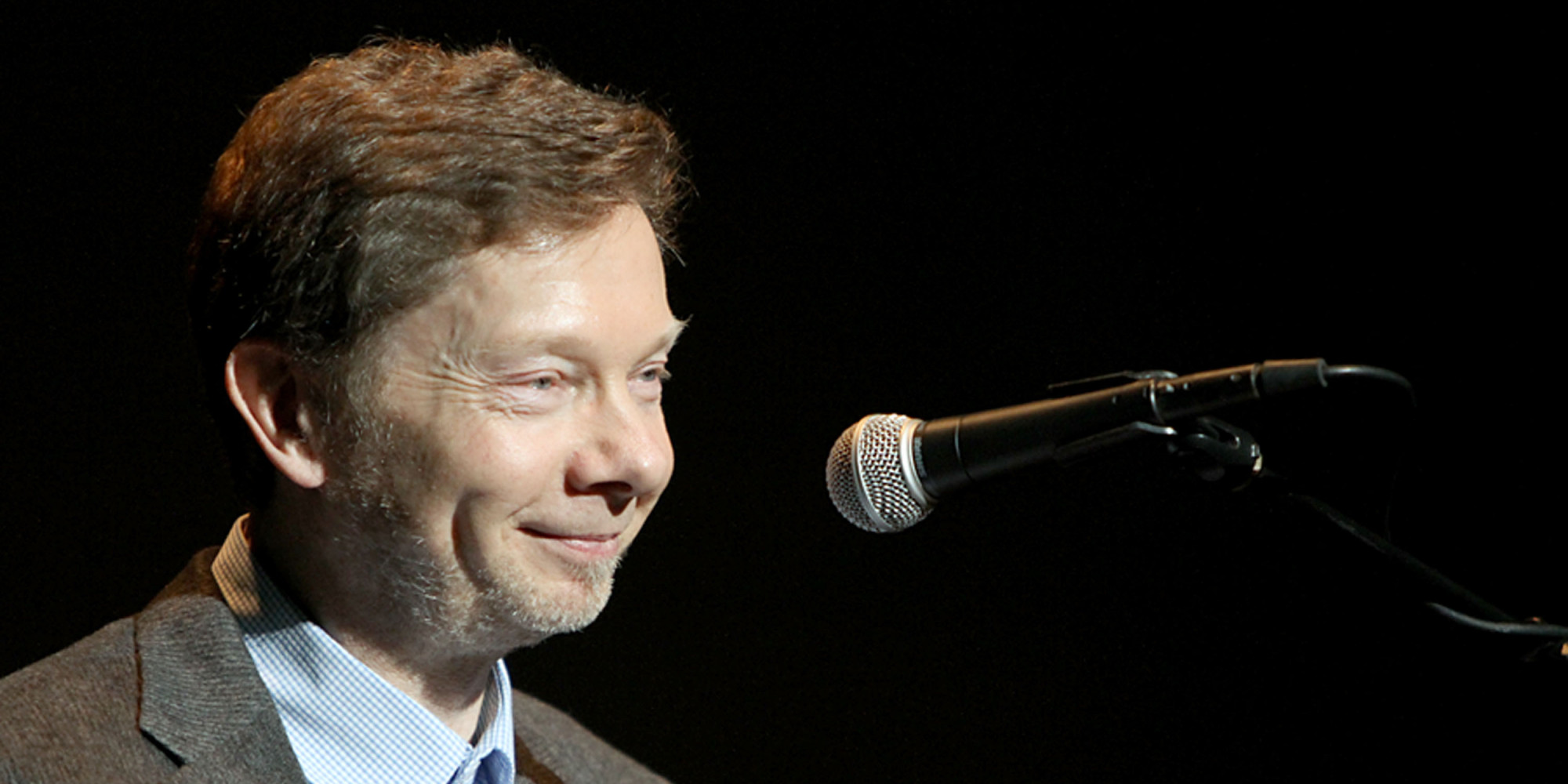
Somewhere in one of Eckhart's lectures he offers a tongue-in-cheek example of how to approach this issue of resistance. Allow me to paraphrase:
When we're feeling down and out, there's often a temptation to be angry with life. But instead of becoming hostile, give the bad feeling 'space' and don't fight it. Just 'shine a spotlight of awareness' on it and mentally witness the bad feeling. Just be a monitoring presence. Say to yourself, 'There's the bad feeling over there and here am I. The bad feeling is not me, is not who I am.' In this you avoid identifying with the bad feeling. And as you do this, in your consciousness, you will feel a kind of 'space' developing around the bad feeling, indicating to you that you and the bad feeling are separate and that the real you can never be touched by any calamity. This separateness will create for you a sense of safety and peace of mind, and you will be able to say, 'It's not so bad feeling miserable. It's ok. Yes, I feel miserable, but it doesn't touch the real me.'
This is exceedingly great wisdom.
|
\
all of the great virtues will be achieved via 'being' not 'doing'
And now I'd like to give you something else, very important. I've hinted at the following in other writings, but it's become more clear to me; in fact, the realization of which prompted me to write this article.
The mind, as we've discussed, is a "doer" and believes that it can elevate itself, by its own efforts, even in terms of spiritual progress, via "doing." But this is not possible, and I will give you several examples of the mayhem. Most of the virtues here are featured, in their own right, with separate articles on the Word Gems site, and I would encourage you to read more therein. But consider this:
(1) Forgiveness is seen as an exercise in "doing" not "being." Forgiveness is presented as something one must "do" as an exertion of will-power, something that's really hard but it's what a good person "does." But none of this groaning and straining toward forebearance has anything to do with real forgiveness. True forgiveness is unaware of itself, occurs naturally and effortlessly as an automatic outpouring of compassion, a sense of connectedness with the "one life" in all creatures. True forgiveness comes by way of "being," a state of consciousness.
(2) Prayer is seen to be an activity of "doing" not "being." We speak of "prayer warriors," indicating combative effort and heroic resolve. The ego-mind thinks that it will be heard, will force God's hand, on the basis of much "doing" in prayer, which Jesus specifically warned against as gross error as it makes God out to be some sort of purchasable and venal despot. This kind of prayer as endurance-run has its long "to do" lists, detailing all sorts of people and situations that require much "doing," a great deal of asking. We break out in a cold sweat just contemplating all the problems that need praying about; but, as they say, we must resign as "General Manager Of The Universe." I know all about this kind of importuning, having explored the depths of it for many years. And while "asking-as-doing" can be a small part of prayer, it is not meant to be the central focus, for to approach prayer in this way speaks of systemic neediness and poverty, which is egoic illusion. The apostle Paul spoke elliptically of true prayer when he said, "pray always," by which phrase he was not encouraging a perpetual needy frame of mind. True prayer is unbroken communion with God; true prayer, "praying always," is a state of consciousness, not "doing" but "being."
(3) Choice is something people associate with voting or making a decision. It's a struggle sometimes to decide. It could go this way or that. It takes a lot of research sometimes to make a wise choice. Or not. But choice properly conceived is not about "doing" but "being." Mystics like Jiddu Krishnamurti and great psychologists like Freud tell us that for all really important decisions in life we must not "choose," as such, but instead we must allow our deepest sensibilities to rise to the surface of awareness, informing us of the right path; in effect, we allow our souls to "decide," and we, at the surface of personality, do not decide. True choice is a function of "being," a state of consciousness, not "doing."
(4) The entire area of religion versus spirituality might be framed in terms of "doing" versus "being." Religion is all about heavy-weight "doing," all sorts of rules and regulations and rituals to observe. But spirituality is about "being," a state of consciousness, concerning one's relationship with God as an internal matter.
(5) Human evolvement, becoming a "good person," is often seen in terms of service and charitable works. The popular idea is that much "doing" for others will somehow turn lead into gold, transforming us into a "good person." But this is wrong - and also very confusing to many. The confusion begins by the false premise of "doing" offering talismanic transformative powers. But "doing" cannot make us come alive. Only "being" can do that; only an elevated state of consciousness will allow us to find the "true self" within, which might then serve as basis of charitable "doing." Good works will naturally flow from a heart that is good, but the "doing" cannot make it good. There are many who try to fool others and themselves that they are "good" by performing charity, but all the while cloaking the monster heart. Becoming a "good person," fundamentally, has nothing to do with "doing" but is all about "being," plugging into Life at the deepest levels of personhood. Footnote: In this short discussion we also are introduced to the cancerous underpinings of a desire to reincarnate. The egoic-mind wants to "do" and often will seek for multiple additional life-times to effect its "salvation plan" based on "doing." But this is all illusion and can come to nothing. See the entire discussion on reincarnation.
(6) Certainty. It can't be achieved via the scientific method, not in terms of its highest expression. Only mystics and poets know of this. Certainty is a state of conciousness, a place where the soul resides; it's not a puzzle or riddle to be solved.
All of the great virtues and human ideals might be presented in this analysis of "doing" versus "being." They've all been corrupted by the egoic mind, in its drive to prove itself by will-power and effort. However, I have saved the most important item for last:
(7) Romantic love. You will want to explore this issue thoroughly in my book, The Wedding Song, which, as per the channeled song, reveals that the true marriage is a "union of spirits," a blending of souls, of intermingled consciousness; and, therefore, let us inform ourselves that John and Mary, the typical couple of the world, cannot even hope to be successful in finding the eternal true love. They approach this quest as something external to themselves, a hunting expedition, an interviewing process, an ill-founded "choice," a search for the "perfect resume." It's all external "doing" for them with scant attention paid to "being." This oversight dooms their efforts from the start as the Sacred Beloved cannot be found via conventional means. No meticulous hunting expedition, no survey of 1000 resumes will avail success. The problem is not finding her, but recognizing her when she comes; moreover, preparing oneself spiritually for her arrival. She might be around you right now, or could have been around you earlier, but if you lacked the requisite state of consciousness, without "eyes to see," you would have totally missed her. Kairissi had this to say, speaking to the "Marys" of the world:
My Dears, you will not find that for which you so earnestly seek by the methods you’ve allowed. That inner “call of the heart,” which yearns to satisfy the womanly unfulfilled aspiration, cannot be addressed by anything material and physical. Your true mate, “somewhere out there,” as the song goes, is not primarily a physical body to you. But John is. That’s the problem with John; to you, he’s just part of the materialistic world. But that true one, for you, is primarily in love with your soul's inner beauty, not your physical beauty. He is, to you, primarily a spiritual entity, and no mere mortal body.
John can be found by "doing" - but your true mate cannot. For you, there are many "fish in the sea" named John. But, in all the universe, there is but one eternal Twin Soul, created just for you.
An Alien's TravelGuide to Earth: Life, the Uncharted World
As a young man, during my Bible-research days, I still recall a sense of fascination discovering a description of Abraham in the book of Hebrews. I've not looked this up but still recall after decades that the patriarch had been a "sojourner" on the Earth.
A "sojourner" is somebody just passing through, just here on a day-trip, not even worth unpacking the bags. I like that. The truth is, we're all alien hitchhikers, "down here" on the "sorrowful planet."
Our world is dominated by the insane ego-mind. The precepts discussed by Tolle and Russell seem strange to us. But this unfamiliarity becomes testimony of the beggarliness of our own spirits and diseased pop-culture. Knowledge of the "true self" and "coming alive" should be the most elementary information, to be offered in schools to little children. And someday it shall be so. But, I think, not in our world, this world "which is another world's hell."
Not many will come alive while on Earth. The odds are against it. A vast array of distractions and oppressors align themselves against such enlightenment. There's so much money involved, so much power-and-control, so much merchandizing of the people, that it's all very difficult to open one's eyes right now.
But, if it is your time to awaken, then I would encourage you to consider all these things and to enter upon a course of study to help yourself find Life. It's hiding from you nearer than you think.
Jesus said that he came to give Life, and that, more abundantly. The real mission of Jesus is not some fabled removal of Nicene-Council defined "sins," but that of leading us into greater Life -- which is elevated levels of consciousness.
|
Does “relaxing into the resistance” equate to Jesus’ teaching of “resist not evil”? But, isn’t it right to oppose and to resist evil?
Jesus’ dictum “resist not evil” seems strange as, it could be said, that's all he did, everything he did was an expression of opposing and resisting evil.
“Resist not evil” does not mean that we’re to become a doormat to dark forces, allowing them to trample us. It is possible, indeed required, for us to inwardly abide in a spirit of “acceptance” toward all that is in the world while maintaining an outward posture of resistance to evil. How does this double-talk work?
We can resist evil, in terms of working for the greater good of all, without becoming inwardly hostile and belligerent toward those who oppose us. As we’re presently speaking of Jesus, a New Testament example will help. Jesus and his men, in their travels, had been rejected by citizens of a village. The hot-headed James and John, personally offended by this rebuff and insult, demanded of Jesus, “Why don’t we just rain down fire on them!” The Great Teacher’s response was, “Guys, you don’t know what spirit you’re of.”
The spirit of James and John was that of animosity in response to a personal attack. But Jesus, in effect, said, “resist not evil”; that is, don’t become hostile and war-like in your spirit, even as you go about doing your work of opposing evil.
We are, in fact, required to resist evil; as with Jesus, it's all that we should do. However, as we oppose the bad things that are done in this world, we are to “accept” what is, in terms of not getting bent out of shape in a spirit of personal vengeance and retaliation. "Acceptance" means maintaining an inner quietude, trusting God that all is proceeding for the world's instruction and long-term good.
fighting monsters
We are not to “resist evil” by using evil tactics, fighting evil with evil, and becoming part of the problem.
Wasn't it Nietzsche who said, if you're going to fight monsters, make sure you don't become one in the process.
|
|
Chief Black Hawk warns us that the thrill of the buffalo hunt just isn’t the same in Summerland
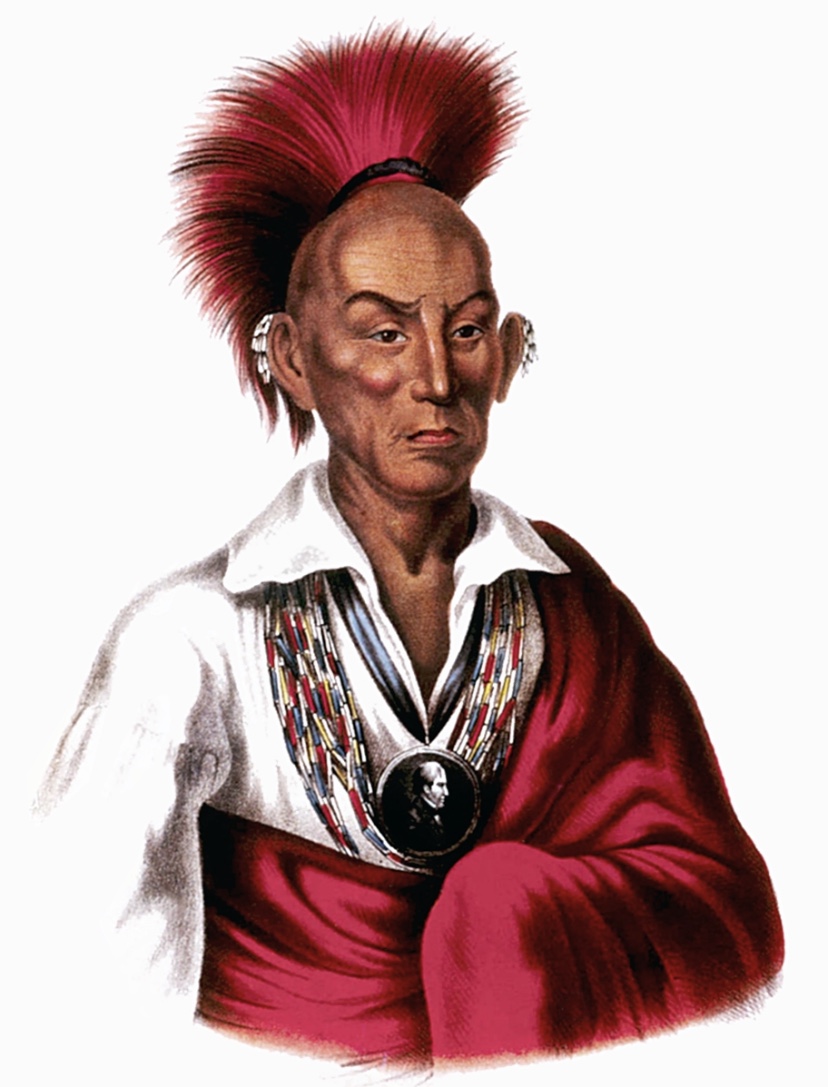
Wikipedia: Chief “Black Hawk (1767 – 1838) was a … leader and warrior of the Sauk American Indian tribe… Although he had inherited an important historic sacred bundle from his father, he was not a hereditary civil chief. Black Hawk earned his status as a war chief … by his actions: leading raiding and war parties as a young man, and a band of Sauk warriors during the Black Hawk War of 1832 [at age 65].”
The following other-side testimony is from CD #8 of the Spirit-Guide Abu taped-lecture series.
I always like the way Chief Black Hawk makes entrance to the teaching sessions: "Greetings White brother and White sister." In his humble salutation, we are stung with remorse in realization of all that we lost by not honoring the rights of the Native Americans.
From time to time, Black Hawk made guest appearances in a forum led by Guide Abu. On one occasion he answered a question about how people live their daily lives in Summerland. He begins by referencing his own people:
hunt-shoot-kill buffalo, no use
Young brave [has] no desire to develop spiritual quality. Red man has habit on Earth to hunt and chase buffalo; to fight; to worship – in Earth way. Red man [crossing over to] spirit world, for a little while, has plenty buffalo, has plenty bow and arrow – buffalo fall dead, first shot. Very good hunter. Very pleased with self – for a while. Not [interested in] developing spiritual quality, merely bring over Earth habit. Young brave, young squaw ... [will] do in spirit [world] ... in [the] beginning, what you like, in Earthly sense – to travel, to visit, to see Earth sites … a little later, whole attitude begin to change. Hunt-shoot-kill buffalo gone, no use. All [desires in Summerland] come, as you wish. The spirit of Red man, White man, [it] matters not, is not content, has everything [he wants], too easy. Wait for a little while, perhaps, a few Earth years, in [this] magic world, you call – the modern phrase – a world of “wish fulfillment.” It’s not illusion. It’s happening [to] spirit [in Summerland]. But, after a while, spirit [persons] realize, “too easy.” And slowly the desire to do Earth things begins to fade. At the same time, [the human] spirit becomes more and more aware of [surrounding] spirit conditions, of other spirit dwellers, of need for service, for loving [good works] – on spirit plane, on Earth plane, below Earth plane [i.e., the Dark Realms] – you, my brother, will know [to] aid and help those in trouble and difficulty. And so, the mind of [a new arrival in Summerland] slowly, gradually turns toward loving, helping, useful work; which, in the doing, will raise spirit vibrations; so that the [new arrival] upon spirit planes shall turn attention in such direction [to good works] and not consider solely self… Those on lower levels need a helping hand to climb out. But, it’s not all work [in Summerland]; plenty time play, plenty time enjoy, plenty time learn – so much all the time to learn…
you can't earn your spirituality like working for a merit badge or a good grade on a test
[and in all this learning, we become spiritually minded and advance; however -- and here Spirit-Guide Abu will] support Black Hawk – not by saying, “now I go to hard work and endeavor to climb the ladder [of spiritual advancement] very quickly.” [Anyone who tries this way to evolvement, by human effort alone,] will not achieve [spiritual success]. Spirit world is not like Earth world [of competition and mere effort, where you] can take a book, and study, and remember, and [exclaim] at examination, “I have learned this, I have learned that,” and now earn a medal and a “big mark” and succeed in Earth terms. Not so in spirit, not so. Not by effort will spiritual qualities be developed… [you] cannot “pass examination” to [advance yourself].
Chief Black Hawk, now on the other side for nearly 200 years, explains the normal “growing pains” of a typical new resident of Summerland. In the beginning, if we know nothing about how things work over there, we will try to create what we knew on Earth; and no one will stop us. If we felt macho on a buffalo hunt, then we can do try to do that again – until it doesn’t work for us anymore. See the discussion in the "Prometheus" book on primitive peoples in Summerland who eventually leave their campfires.
Disillusionment with traditional modes of living is meant to lead us to higher, broader planes of thought. However, some get stuck on lower levels. For them, a sense of discontentment, which should be mere passing phase, as the Chief suggests, settles in as a hardened way of looking at life. In this dysfunctional state, nothing is ever enough – this is the pathological frame of mind suffered by the “insane 500.”
Effort is required to grow spiritually. But, as Black Hawk advises, it is not the effort per se that advances us. We already have the life within and so there’s no need to huff-and-puff our way toward acquiring it. Please review the four articles on the nature of spirituality for further discussion.
|
|
everything the ego does devolves to one central pathology
All this talk of the Ego and its ensuing widespread calamity may seem overdone. Therefore, allow me another attempt to explain the pervasive nature of its sordidness confronting every human being.
What do the following 10 examples have in common?
(1) the elderly lady, visibly frightened of new information which might threaten her view of a particular god or goddess rescuing her upon transition to the next world;
(2) screaming fans, shouting with hysteria, hoping to touch, or even glimpse, an adored celebrity;
(3) billionaire corporate heads employing new technology to increase surveillance on a populace, thereby diminishing rights to privacy;
(4) national leaders, with big sloppy grins, posing as benefactors to the country’s interests, while undermining civil liberties, the rule of law, and taking to themselves more power;
(5) supervisors or fellow co-workers seeking to deny promotion or commendation, though you’ve earned it and are the best choice for the new position;
(6) social-media platforms which censor free speech because of "misinformation," meaning, it doesn't conform to a totalitarian agenda;
(7) materialistic scientists who repress, ignore, or otherwise vilify the "scientific evidence for the afterlife";
(8) a friend, lover, or family member who insults you, slants a story, attacks you, cheats you, because they disagree with, and are threatened by, your new-found beliefs.
(9) the neo-Postmodernist, the delusional “woke” adherent, occupying the lowest level of consciousness, arrogantly and vacuously proclaiming that rationality itself is part of “white man’s” oppression; that, even to be on time for work is a “white thing”;
(10) the soldier, part of an invasion force against a peaceful people, firing on, murdering, civilians because it’s his “duty” to “follow orders” of his imperialistic superiors.
We could go on listing many more: the gossip in your neighborhood who stands by her window, judging and condemning, trafficking in the mundane details of others; the college instructor who ridicules, and punishes with lower grades, those who disagree with his totalitarian leanings; the so-called news-reporter, piously claiming to have entered her profession to “make a difference,” incessantly offering selective and screened factoids to support a hoped-for Orwellian dystopia; the suicide-bomber, or the mad driver barreling into a crowd of civilians, or the shootist, seeking for publicity, or revenge; the high-school friend, once a confidante, but suddenly counting you an enemy when she veers off into new philosophical moorings; the martinet husband, psychologically, or otherwise, abusing a wife whom he does not love yet will not allow to leave his fiefdom.
What is the common thread?
In each case, a needy ego has identified with some power-structure, some external augmentation, some strong “father figure” to the inner child; an adoption of surrogate life, a face-saving production, a seeking to enhance oneself, to make oneself “more” and “above,” to feel important and a “somebody”, a propping up and bolstering, an assuagement of underlying fears of “not making the grade,” of “I am not enough,” leading to a surrendering of autonomy and critical faculties, a victimhood pathology of linking oneself to some external image of authority or purported salvation.
According to the great psychologists, in its deepest writhings, all of these examples represent the fear of death on display. In each case, a perceived locus of one's life and essence, one’s “center of being,” lies outside oneself, stands subservient to some icon of imagined greater energy, wisdom, or value. In other words, in all this dysfunction there is no sense of having been "made in the image," of “being enough,” no personal view of the limitless "inner riches," one's divine heritage as "spark struck-off from God." As such, this deficit leads to servility, to existential crisis, to forms of insanity. And therefore nearly 100% of the denizens of planet Earth are engaged in some form of the above cultism.
|
more than drinking the koolaid
The long reach of cultism encompasses much more than crackpot churches. The root idea of cult offers the sense of "cut." This core concept of "cut" leads us to images of refinement and refashioning and, by extension, development, control, pattern, order, and system.
Cultism as systemization finds a ready home in religion and philosophy which seek to regulate and redistill the patterning and ordering of ideas. However, in a larger sense, the spirit of cultism extends to every facet of society. We find it scheming and sedulously at work in politics, academia, family, corporations, entertainment, science, artistry – anywhere power might be gained by capturing credulous and fear-based minds.
See the “cultism” page for a full discussion.

|
I submit to you, every insult, abuse, affront, contempt, disrespect, misrepresentation, aggression, assailment, invasion, violation, trespass, usurpation, infringement, conflict, and war – in the history of the world, and your own personal history -- have resulted from egos, at the expense of others, attempting to feel better about themselves, pursuing to quash the sense of inner neediness, of “I don’t have enough” because “I am not enough.”
every ego wants something from you
What does it want?
It wants to use you to feel better about itself, to fill up the emptiness inside. It will attempt to accomplish this make-over by (1) comparing itself to you, finding some metric by which it can judge itself as superior; (2) deriving pleasure from you, an effort to cloak the pain within; (3) ruling over you, power-and-control measures, to enhance and propagandize itself; (4) minimizing, discounting what you represent in order to aggrandize its distorted belief system about how life works; alternatively, if demonizing doesn’t succeed, it will (5) surrender to you, call you a genius or a god, by which subservience it hopes to find security and safety under the protective mantle of a “strong father figure.”
further distillation
Can we, even more, reduce all of the above to common element?
The ego, at a deeper level, is driven to create a perception of itself as “other.” This generalized sense of “otherness” is then leveraged into a “me against them” lens of looking at the world. And it’s not just a contrariness toward other people. If others aren’t around, or even if they are, the ego can make us feel estranged from life itself and, of course, God, as well, as we blame, and set ourselves against, these for perceived unfairness.
Why is this important to the ego? According to ancient Spirit Guides, we come to this world for one primary reason: to individuate, to become persons in our own right; all other aspects of development, for the moment, are secondary.
The ego will reconfigure memories and current sensations to emphasize “otherness.” Much of this reformulation can be very unpleasant to contemplate, but it does accomplish one thing: even though at the quantum level we are connected to all, at the surface of personality “otherness” creates a stand-alone psychological entity that becomes the perception of “I”, which is the very definition of ego.
Editor’s note: Concerning the above “10 examples,” each of these represents a certain unsavory aspect of the dark side of human nature. But this skews the picture. The dysfunctional ego also operates in the arena of heroic service and commendable, stalwart mettle.
I am thinking of the celebrity artist, athlete, singer, politician or other notable who publicly dedicates his or her life to good works as a result of purportedly drawing strength from a patron saint, religious icon, or savior-god. The ensuing good works might be larger-than-life, consummated even in the face of great privation and adversity. All of which is meant to proclaim to the world, “I do all this by the power of my relationship to said patron saint, religious icon, or savior-god.”
But, is this reality? How are we to view such valorous and epic conduct? Does it happen by way of aligning one’s person with an external divinity?
We would do well to recall that any number of non-religious “secular saints” might be brought to our attention who have nobly, in a lion-hearted way, offered charitable service, even to the point of death. One example immediately comes to mind: Dr. Viktor Frankl, in the concentration camps. He accepted the task of encouraging other inmates, despite near-starvation and often-beatings by the guards. He served the contagious typhoid dying, and, more than once, refused opportunity to escape the camp in order to remain with the suffering.
The dysfunctional ego is led by its foundational premise, “I don’t have enough” because “I am not enough.” As such, it looks for salvation from an outside source. This is pathological and takes us in the wrong direction, far from sacred destiny of living from one’s sacred center, the true self, one’s inner connection to God.
We are not to conduct ourselves as little children, living under the mantle of a “strong father figure,” a patron saint, religious icon, or savior-god.

We are to open our eyes to the inner riches, the innate “made in the image” reservoir of strength, available to all of us as sons and daughters of God.
|
|
Restatement: ‘relaxing into the resistance’
We don’t understand this instruction of "relaxing.". It’s counter-intuitive. If something needs to be done, we want to attack it directly. But that approach won’t work in this case.
This analogy might help. Think of a glass being filled by rushing tap-water.

displace
The glass is overflowing with water. In this process, the water in the glass is being displaced by new water coming in.
In principle, this can help us when the dysfunctional ego swamps us with hurtful mental images. We need to displace the bad image with something new coming in.
Our natural impulse is to fight the bad image. We try very hard not to think of it and to put it away. However, in this display of will-power we inadvertently strengthen to the ego. The harder we fight, the more energy the ego takes in.
Instead of direct frontal attack, of gritting our teeth and trying very hard to overcome the bad image, we need to “relax into the resistance.” We want to “displace” not directly attack. We do this by “simply noticing” the “life within.”
When the ego attacks, mentally focus on, for example, the life in your hands. Can you feel the tingling? Stay with it. Allow, if possible, the scope of perceived living energy to encompass more of the body.
The ego cannot “play sad movies in the head” while, at the same time, we focus on the life within.
Sometimes the ego’s attack comes with such force that, for a while, nothing seems to help and center us. But stay with it. Focus on the energy within. The storm will break.
|
|
‘notice the disorder’
Krishnamurti frequently admonishes “notice the disorder,” do not fight or condemn what is seen with the inner eyes but simply acknowledge.
But, exactly which aspect of the disorder are we to focus on?
We are not to focus on the disturbing “images” themselves. These can be quite horrid, and we don’t want to encourage or fix these upon the memory. Yet, while we do not like their presence, we are not to “fight” these images. How to handle this?
I have learned, by trial and error, how this process is to work. Try it for yourself and find the right way, for you, to mentally apprehend. Instead of “fighting” the image, or saying “I ought not to be seeing this in my head” -- which creates a sense of conflict and strengthens the ego – try to switch one’s focus to the underlying energy. Yes, there may temporarily be a sordid image by which the ego torments, but can you “go beneath” the image and focus on the energy that’s propping it up? You’ll need to work with this, trying different approaches, to see what I mean, but, when it works for you, you will easily slip into a mode of simply “noticing the disorder” - not the image but the underlying energy.
This, I believe, and sense, is an incredibly important mental skill. The mind serves us in many ways but, one primary way, is to become for us a virtual “radar screen” which will immediately evaluate all energies that cross its field of purview. When we become skilled at this, we will instantly perceive an energy that is “out of alignment” with the spirit of God.
The rational part of the brain is not involved at all. It’s pure intuition at work. And now we’ve entered the realm of which the apostle Paul spoke concerning those who “live in the Spirit.” These, he said, judge all things, discern all things. And it’s done instantly, without the rational mind making a decision. Instead, the mind, now sensitized to alien-ungodly energies, automatically flashes a warning on the “radar screen” of the spirit-led mind.
And this entire process of discernment is developed by “simply noticing the inner disorder.” One’s ability in this area of expanding consciousness will just grow and grow, unlocking more and more of the soul’s inner riches. As Kairissi joked, “next thing you know, you’re 5 billion years old and aware of every life form in the universe.”
|
attempting to define life and consciousness
|
K. Elenchus, it occurs to me that the reason why we see things more clearly when we enter the state of “no you and no me” is because, as we’ve said, what we are as “persons” is not a stand-alone entity before God.
E. This can be confusing because the Little Me Ego constantly preaches separateness.
K. It has its own agenda. But in reality we’re extensions of God, each of us a subdivision of Universal Consciousness, and not separate at all.
E. As Dr. Kastrup said, we’re like whirlpools in the same pond.

K. And so there really is “no you and no me” but only an illusion of separateness. No wonder we see more clearly when we mystically enter “no you and no me.”
E. It’s funny, the very word “individual” means “undivided”.
K. That is strange because we use "individual" to indicate “separate,” which is the very opposite of its literal meaning.
E. And the word “person,” too, means “mask”; again, the separateness is just a mask we wear.
K. Another false reading.
E. And so, what would you say, Kriss – what are we exactly?
K. Well, we have this sense of a thing called “I”, or a perception of self-awareness.
E. The term “ego” itself means “I” and imparts a feeling of self.
K. And "self" is accurate, but only to an extent. We are separate, but not as stand-alone entities, only “wholly owned subsidiaries of a parent corporation.”
E. I like that.
K. We say that we have “consciousness,” we say that we have “life.” But we have nothing of and by ourselves for what we have derives from a central Source.
E. From a larger perspective, it’s more accurate to say that we, not have but, “are” consciousness and life; because, beside these, there is no “me”.
K. We’re falling deeper down the rabbit-hole here, but when we say that we have self-awareness, a sense of “I,” this would mean, I take it, that the essence of Universal Consciousness is a perception that “I exist.”
E. Kriss, it’s noteworthy that one of the famous names of God in the Bible is “I am that I am," the self-existent one.
K. The original writer or shaman of that document channeled this information from higher sources. It's one of the accurate things in the Bible. And so we, as derivatives of God, experiencing a sense of “I am,” are in fact affirming that we're part of Universal Consciousness.
E. And how would you define “life”?
K. Fundamentally, what we call “life” is not a product of chemicals interacting – these merely sustain and perpetuate, but cannot originate.
E. They are editors not authors.
K. Yes, very good, editors not authors. And so it seems that “life”, necessarily so, is inherent within, or naturally flows from, Universal Consciousness, along with self-awareness. All these are indissolubly united, with no division possible.
E. You can’t have awareness without life. Can we have life without consciousness?
K. Many would say that consciousness resides only with higher-order entities. But maybe this isn’t totally true as even a stone, filled with the "life" of quantum activity, “knows” its place in the cosmic order. (See more discussion in "The Wedding Song".) But I think Dr. Sheldrake was onto something when he said that “consciousness is a quantum field of possibility.”
E. We confuse the definition of “life” with things like heart-beats and blood flow, but there are entities in worlds beyond ours, more alive than we, who don’t necessarily have heart-beats.
K. Mortals are prejudiced in favor of bodily definitions. But as we look at the issue more closely, the heart-beats and blood-flow are just a transient feature for lower-level creatures. The real essence of life has to do with Sheldrake’s “quantum field of possibility.”
E. What would you say this means for us still weighed down with the mortal body?
K. I think it means that each of us is a vast field of “no upper limit”, unbounded potential for growth – growth toward emulating Source.
E. We’re waiting for you to say, “oh, that little thing.”
K. I was getting to that.
|
|




